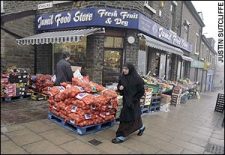 It has been more than 40 years since Tim Carbin walked the length of Oak Lane, the Bradford backstreet of his boyhood. Then, when he lived with his grandmother Florence Pawson, a matriarch within the community, his task after school was to run errands. Down to Foster’s, the baker’s, for a loaf of bread and a pound of bacon from Donald Gilbank the butcher. “And mind it isn’t too fatty,” Florence would tell him.
It has been more than 40 years since Tim Carbin walked the length of Oak Lane, the Bradford backstreet of his boyhood. Then, when he lived with his grandmother Florence Pawson, a matriarch within the community, his task after school was to run errands. Down to Foster’s, the baker’s, for a loaf of bread and a pound of bacon from Donald Gilbank the butcher. “And mind it isn’t too fatty,” Florence would tell him.
Mr Carbin, then 13, knew all the local storekeepers by name, just as he knew the families in the surrounding terraces. Yesterday, outside number 95A, his grandmother’s former home, Mr Carbin gazed in bewilderment as he scanned his old haunt. Not surprisingly, the stores of his youth had gone: such has been the change in our shopping habits over the decades that they have given way to supermarkets and fast-food outlets.
But that was not all that had changed irrevocably in Oak Lane. Among the new stores, the clothes shops sell Muslim dress, the butcher stocks halal meat and even the local takeaway advertises halal pizza. “I feel like an alien, like I’m on a street in Karachi,” Mr Carbin says, awkwardly. “I don’t feel I have anything in common with this area.” He now lives just 10 miles away, in the north of Bradford. He hasn’t returned because Oak Lane, like so many similar areas of so many northern cities, is now an almost exclusive Asian Muslim community.
“This isn’t, as the Government would like us to believe, a multicultural society,” he says. “This is pure racial segregation. And it’s like this because the Muslim community simply refuses to integrate. So people like me feel like outcasts in our own country.”
